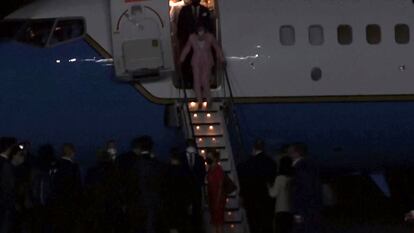Nancy Pelosi lands in Taiwan despite Chinese warnings
Beijing announces live-fire military maneuvers near the island while Taipei raises the alert level following the arrival of the US House Speaker

Nancy Pelosi has ignored China’s threats and even the advice of her own government. The Speaker of the US House of Representatives adhered to her initial plan and landed in Taiwan this Tuesday at around 10.40 pm local time. Though not officially confirmed, the visit is part of her Asia-Pacific tour that began on Monday, and it is sure to infuriate Beijing and aggravate the already deteriorated relations between the two major world powers.
“Our delegation’s visit to Taiwan honors America’s unwavering commitment to supporting Taiwan’s vibrant Democracy,” said Pelosi on Twitter.
Our delegation’s visit to Taiwan honors America’s unwavering commitment to supporting Taiwan’s vibrant Democracy.
— Nancy Pelosi (@SpeakerPelosi) August 2, 2022
Our discussions with Taiwan leadership reaffirm our support for our partner & promote our shared interests, including advancing a free & open Indo-Pacific region.
The speaker began a controversial trip through the Asia-Pacific region on July 31. Although her official itinerary did not include the island, US news outlets had widely assumed that Pelosi would make a stop in Taiwan after unnamed White House sources confirmed those plans despite serious Chinese pressure. In a lengthy July 28 video call, President Xi Jinping warned President Biden that a visit to Taiwan by Pelosi would be “playing with fire.” Tensions between the two nations continued to escalate at the mere suggestion that Pelosi might set foot on land that Beijing claims as its own.
On both sides of the Taiwan Strait, troop deployment increased throughout the day in anticipation of Pelosi’s arrival. As reported by the Southeast Taiwan Airspace Broadcasting Channel, a Chinese army plane flew into Taiwan’s air defense zone at around 9.30 pm local time.
The Chinese Foreign Ministry has issued a lengthy statement condemning the visit, which “sends the wrong message about Taiwan’s independence to the separatist forces”. In its statement, the ministry reiterated that “there is only one China in the world, and Taiwan is an inalienable part of it” and that “the only legitimate government is that of the People’s Republic of China”. The statement emphasized that Taiwanese and US authorities are to blame for rising tensions and challenges across the strait, as they are “constantly changing the status quo.” The state-run Xinhua news agency has announced that Beijing will conduct more military live-fire exercises in the vicinity of the island from August 4-7.
China considers a high-level meeting between US and Taiwanese officials – the first in 25 years since Republican Newt Gingrich’s visit during the Clinton administration – a serious provocation. Beijing strongly opposes any show of US support for Taiwanese independence and has vowed to take decisive action against it. President Xi Jinping warned his counterpart in their recent video call that the US should not “underestimate the resolve of 1.4 billion Chinese citizens.” The Taiwan issue is one of the biggest areas of disagreement and tension between the two nations, and consumed a large part of the conversation between the two leaders that lasted more than two hours.
President Biden had recently shared the Pentagon’s concerns about the security issues related to Pelosi’s trip. But Biden, a US senator for 36 years, is a firm believer in an independent legislative branch, which is why some analysts believe he did not press Pelosi harder to change her mind. Kirby told the news media that Biden made this clear to Xi during their call.
For Beijing, visits by senior US officials to the self-governed island send a message of support for Taiwanese independence. Bilateral relations between the world’s two largest economies have been based on the One China principle since 1979, when relations were re-established. This principle affirms that there is only one China, which includes Taiwan, where Nationalist troops led by Chiang Kai-shek took refuge in 1949 after being defeated by Mao Zedong’s communist forces in the civil war. The US interpretation of the One China principle recognizes the Beijing government in mainland China, but maintains that Taiwan’s status is undetermined. The US has maintained a “strategic ambiguity” regarding Taiwan and has sold it weapons for self-defense in the past. Biden has said he is prepared to provide military assistance to Taiwan in the event of an attack.
Since Tsai Ing Wen, an advocate for an autonomy from Beijing, was elected president of Taiwan in 2016, official Chinese rhetoric has become increasingly forceful about an “inevitable” future reunification. Pelosi’s trip has spurred Xi Jinping’s administration to ramp up the rhetoric even further. On the eve of the 20th National Congress of the Chinese Communist Party, President Xi cannot afford to flinch if he expects to be re-elected for an unprecedented third term.
Tu suscripción se está usando en otro dispositivo
¿Quieres añadir otro usuario a tu suscripción?
Si continúas leyendo en este dispositivo, no se podrá leer en el otro.
FlechaTu suscripción se está usando en otro dispositivo y solo puedes acceder a EL PAÍS desde un dispositivo a la vez.
Si quieres compartir tu cuenta, cambia tu suscripción a la modalidad Premium, así podrás añadir otro usuario. Cada uno accederá con su propia cuenta de email, lo que os permitirá personalizar vuestra experiencia en EL PAÍS.
¿Tienes una suscripción de empresa? Accede aquí para contratar más cuentas.
En el caso de no saber quién está usando tu cuenta, te recomendamos cambiar tu contraseña aquí.
Si decides continuar compartiendo tu cuenta, este mensaje se mostrará en tu dispositivo y en el de la otra persona que está usando tu cuenta de forma indefinida, afectando a tu experiencia de lectura. Puedes consultar aquí los términos y condiciones de la suscripción digital.








































